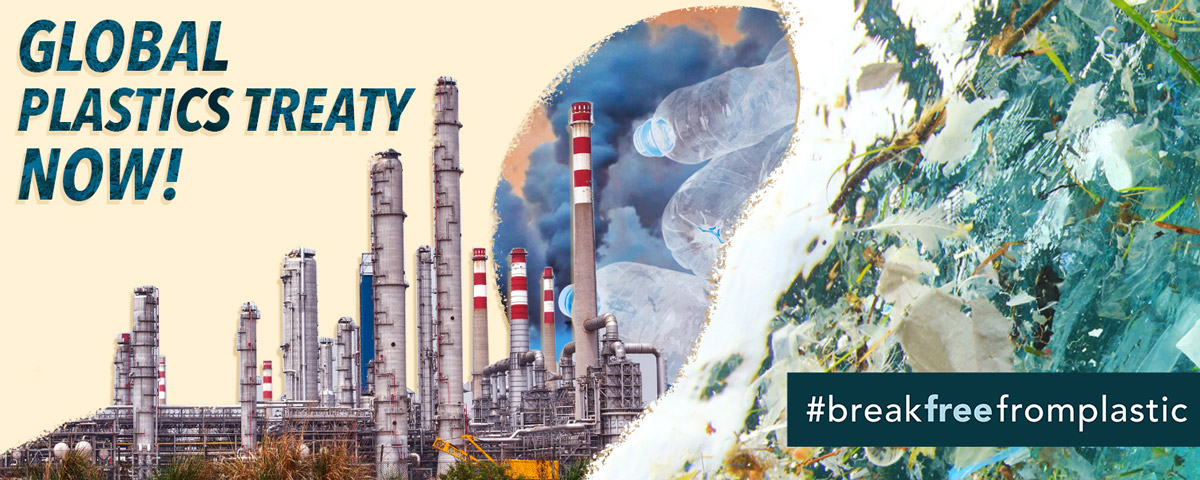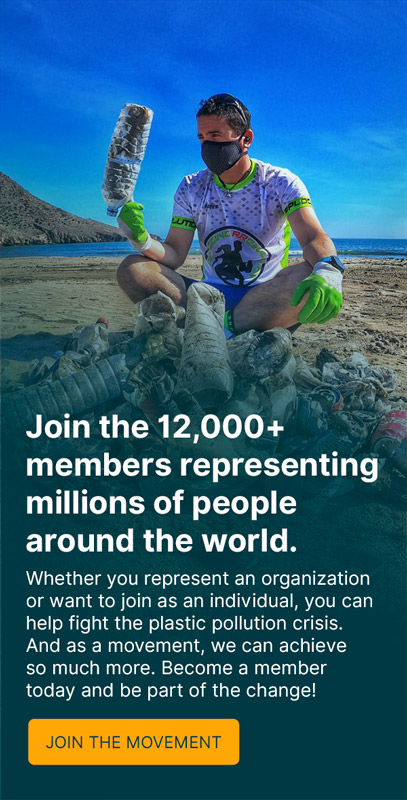Nairobi, Kenya – The global #breakfreefromplastic movement today hailed the adoption of a landmark mandate calling for the development of a global treaty on plastics, which has been adopted upon conclusion of the resumed fifth session of the United Nations Environment Assembly (UNEA 5.2).
This mandate, titled “End plastic pollution: Towards an international legally binding instrument”, sets the stage for governments to negotiate a comprehensive and legally binding treaty that will cover measures along the entire life cycle of plastic. The mandate will serve to guide the development of the treaty itself, which an International Negotiating Committee (INC) will be tasked with drafting over the next two years.
In addition to laying the groundwork for a legally binding treaty that considers the full life cycle of plastic—from fossil fuel extraction, to plastic production and consumption, to post-consumer waste—the mandate also sets a broad scope for the global treaty to cover all plastic pollution in any environment or ecosystem, which goes beyond earlier concepts of “marine plastics” that would have been insufficient to address the true scale of the plastic crisis.
Plastic pollution doesn’t stop at borders. Toxic plastic particles exist in the water we drink, the air we breathe, and in the most remote parts of the planet. Microplastic particles have even been observed in maternal human placenta. Plastics also leach hazardous chemicals that can harm human health, including disruption to the endocrine system, reproductive issues, and a range of life-threatening impacts. More than 460 million metric tons of plastic are produced each year, and 99% of plastics are produced from fossil fuels. This means that addressing the plastic crisis at its source, i.e. plastic production, is also an important piece of addressing the climate crisis.
A recent global survey revealed that 75% of people want single-use plastics banned as soon as possible for all these reasons and more. A Global Plastics Treaty would be a turning point in the fight against plastic pollution, as demanded by more than one million people worldwide who petitioned government delegates ahead of the meeting in Nairobi. This show of public support is also supported by 450 scientific experts, 1,000 civil society organizations, and 70 businesses.
Unfortunately, negotiations for a strong treaty covering the full life cycle of plastics are also facing resistance from petrochemical and fossil fuel companies who are opposing proposals to limit the production of plastics, which is set to double in the next two decades.
“This landmark decision sets the stage for an all-inclusive approach to resolve the plastic pollution crisis,” said Von Hernandez, Global Coordinator, Break Free From Plastic. “Receiving the recognition that this problem needs to be addressed across the whole plastics value chain is a victory for groups and communities who have been confronting the plastic industry’s transgressions and false narratives for years. The #breakfreefromplastic movement stands ready to contribute meaningfully to this process and help ensure that the resulting treaty will really prevent and stop plastic pollution.”
A spreadsheet of brief quotes from leading organizations and experts around the world can be found here.
CONTACT:
- Asia & the Pacific: Jed Alegado, Jed@breakfreefromplastic.org & Eah Antonio, Eah@breakfreefromplastic.org
- Europe: Bethany Spendlove Keeley, Bethany@breakfreefromplastic.org
- United States: Brett Nadrich, Brett@breakfreefromplastic.org
- Global Press Contact: Caro Gonzalez, Global Communications Lead, Break Free From Plastic, Caro@breakfreefromplastic.org
###
#breakfreefromplastic is a global movement envisioning a future free from plastic pollution. Since its launch in 2016, more than 2,500 organizations and 11,000 individual supporters from across the world have joined the movement to demand massive reductions in single-use plastics and push for lasting solutions to the plastic pollution crisis. BFFP member organizations and individuals share the shared values of environmental protection and social justice and work together through a holistic approach to bring about systemic change. This means tackling plastic pollution across the whole plastics value chain—from extraction to disposal—focusing on prevention rather than cure and providing effective solutions. www.breakfreefromplastic.org
📢 BREAKING: Today, civil society leaders, including many organizations from the #breakfreefromplastic movement, delivered a petition with more than 1 MILLION signatures calling for a global legally binding #PlasticsTreaty.
We have #AllEyesOnUNEA 👀https://t.co/rhVZvwydGI pic.twitter.com/yY5Xa3IIwl
— breakfreefromplastic (@brkfreeplastic) March 2, 2022



